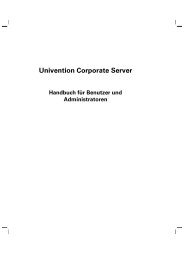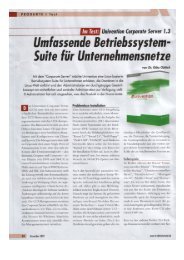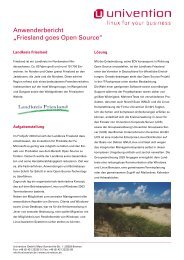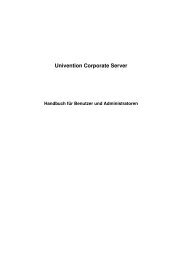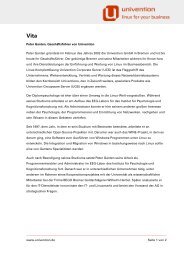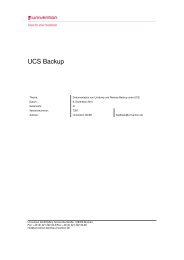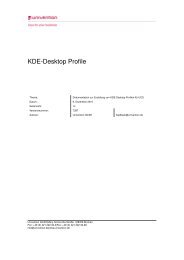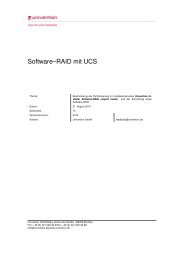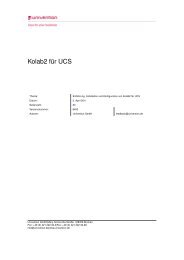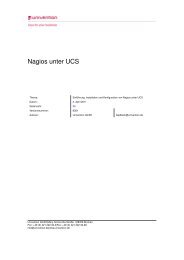UCS 2.4 - Univention
UCS 2.4 - Univention
UCS 2.4 - Univention
You also want an ePaper? Increase the reach of your titles
YUMPU automatically turns print PDFs into web optimized ePapers that Google loves.
12 Mail<br />
/etc/init.d/postfix restart<br />
If the <strong>Univention</strong> Configuration Registry variable mail/archivefolder is set to an e-mail address, Post-<br />
fix sends a blind carbon copy of all incoming and outgoing e-mails to this address. This results in an<br />
archiving of all e-mails. As standard the variable is not set. If there is no mailbox for this address, one will<br />
be created automatically.<br />
The <strong>Univention</strong> Configuration Registry variable mail/postfix/dnslookups (yes/no) is used to config-<br />
ure the DNS resolution of hostnames for the delivery via SMTP and LMTP. If the variable is set to no the<br />
resolution occurs over the standard system routine, which typically also enters entries in the /etc/hosts<br />
file.<br />
In a number of error situations (e.g., for non-existent users) the result may lead to a mail bounce, i.e.,<br />
the mail cannot be delivered and is returned to the sender. When the <strong>Univention</strong> Configuration Registry<br />
variable mail/postfix/softbounce is set to yes mails are never returned after a bounce, but instead<br />
are held in the queue. This setting is particularly useful during configuration work on the mail server.<br />
Mail routing is usually effected via MX records saved in DNS. In special cases - for example, the operation<br />
of a tunnel between two servers which cannot be resolved via DNS - it may be necessary to configure a<br />
manual transport route. Thus can be added to the file /etc/postfix/transport using the <strong>Univention</strong><br />
Configuration Registry variable mail/maps/transport/IDENTIFIER. An example:<br />
mail/maps/transport/1="somedomain.org smtp:[mail.somedomain.com]"<br />
Sometimes it is necessary to rewrite e-mail addresses, for example when new e-mail addresses are<br />
added during a restructuring operation. This can be effected using canonical mappings. The Univen-<br />
tion Configuration Registry variable mail/maps/canonical/sender/enable can be used to rewrite<br />
on the server side either using the file /etc/postfix/canonical_sender (file) or via access to the<br />
LDAP (ldap). The settings for reformulating recipient addresses are performed over <strong>Univention</strong> Configu-<br />
ration Registry variable mail/maps/canonical/recipient/enable. If it is configured to file, the file<br />
/etc/postfix/canonical_recipient is read out; access to the LDAP (ldap) is also possible here.<br />
<strong>Univention</strong> Configuration Registry variable mail/maps/canonical/sender/classes can be config-<br />
ured to specify which address information should be converted. The options available for selection are<br />
envelope_sender and/or header_sender.<br />
If the package univention-mail-cyrus is installed, SMTP authentication is available as standard.<br />
If univention-mail-postfix is intended to be operated independently, the configuration for the au-<br />
thentication service saslauthd must be adjusted manually and the following entry entered in the<br />
/etc/default/saslauthd file:<br />
START=yes<br />
Postfix then uses the saslauthd for the authentication.<br />
12.3.2 IMAP/POP3 server (Cyrus)<br />
Cyrus offers IMAP and POP services preconfigured using the univention-mail-cyrus package. The au-<br />
thentication is performed using the primary e-mail address. That means that the e-mail address should be<br />
258



